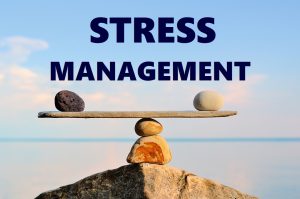Stress is an integral part of life and may even prove useful at times, yet long-term exposure to it can lead to depression and other mental health conditions.
Learn to manage stress effectively through eating right, getting enough restful sleep and prioritizing self-care. Keep a stress diary to pinpoint any triggers of increased tension.
1. Exercise
Stress is a normal reaction to life’s demands. While some stress may be beneficial, too much prolonged anxiety may become harmful and interfere with daily tasks.
As stress can have detrimental effects, it’s essential that we take control of our emotions, schedules, environments and relationships in order to combat its harmful effects. These tips can assist with this goal!
Exercise has numerous health advantages, including lowering levels of cortisol and adrenaline stress hormones. Make physical activity part of your daily routine starting with just 10-15 minutes a day until gradually increasing the duration. Also try mixing up workouts to keep things interesting and avoid boredom; just make sure not to push too hard if this is new territory for you!
2. Eat Right
Diet is not only vital to physical wellbeing; it can also have profound emotional ramifications. A diet rich with nutritious foods can boost energy levels, support brain function and provide relief from stress.
Foods rich in proteins, antioxidants and healthy fats (such as avocados, nuts and leafy greens ) are highly recommended to support mental health. Caffeine and sugar should be limited for best results on your wellbeing.
Keep in mind that certain foods may interact with medications used for mental health conditions, so before making changes to one’s diet it is always a good idea to consult a physician or psychologist first. Also keeping a food diary may help pinpoint which items make someone feel well over time.
3. Get Enough Sleep
Sleep provides your mind and body with essential fuel, enabling it to function more smoothly, making better decisions, reducing stress levels and helping to ease difficult times more easily.
Everyone experiences stress from time to time; however, prolonged exposure can put your health in jeopardy. Over time you could develop heart disease or suffer a reduced immune system which puts you more at risk for infections.
Discover ways to recognize when you are experiencing stress and take swift action before it leads to mental health complications. Be wary of physical indicators like tight muscles, headaches or migraines as well as emotional ones like irritability and forgetfulness; avoid unhealthy coping mechanisms like alcohol consumption, drugs usage or overeating which could worsen stress; instead opt for healthy techniques like yoga, meditation or deep breathing to ease it before bedtime. Plus keeping your bedroom dark, quiet and at a comfortable temperature may help immensely!
4. Take a Break
Finding activities to recharge your energy can be the key to finding balance in life, such as taking part in physical activities or engaging in creative hobbies. Switch up the types of breaks you take so that different aspects of your well-being are revitalized.
Regular breaks are key for mental wellbeing as our minds cannot focus for prolonged periods without periodic rest and rejuvenation. Failing to take advantage of this natural process can result in burnout – an exhaustion caused by constant stress which causes emotional and physical exhaustion.
Retaking control may mean taking a 10-minute meditation session, spending an afternoon outdoors or even taking a relaxing bath – there is no universally applicable solution; rather the key to finding relief from daily stresses lies in taking steps toward self-care and relieving yourself from unnecessary strains like toxic relationships and unhealthy habits.
5. Talk to Someone
If you recognize someone in your life is struggling, encourage them to seek assistance. If you need help initiating this conversation, here are some guidelines on how to start it:
At first it may feel awkward, but once they begin opening up they will soon feel heard and supported. You could offer to check-in or connect them with assistance options as necessary.
Stress can be an unavoidable part of life, but when prolonged it becomes an issue. If a friend exhibits signs of prolonged stress such as being irritable or experiencing headaches, encourage them to take steps towards managing it.
Remind them that others have experienced similar circumstances to them and you understand what they are going through – this may make them feel less isolated and help reassure them they’re not weird or crazy.
6. Practice Self-Care
Everyone experiences stress at one point or another; however, when your stressors become chronic and long-lasting it becomes harder to remain healthy and live an optimum lifestyle. Therefore, practicing self-care regularly is so crucial in keeping one healthy.
Self-care includes taking steps like getting enough rest, eating healthy foods and engaging in regular physical activity. But it also means taking steps to alleviate daily pressures by learning how to say no and prioritizing tasks.
Stress relief often involves some sort of sensory input, like listening to soothing music or squeezing their favorite plush toy. It’s important to try different things until you find what helps calm and relax you the most.




